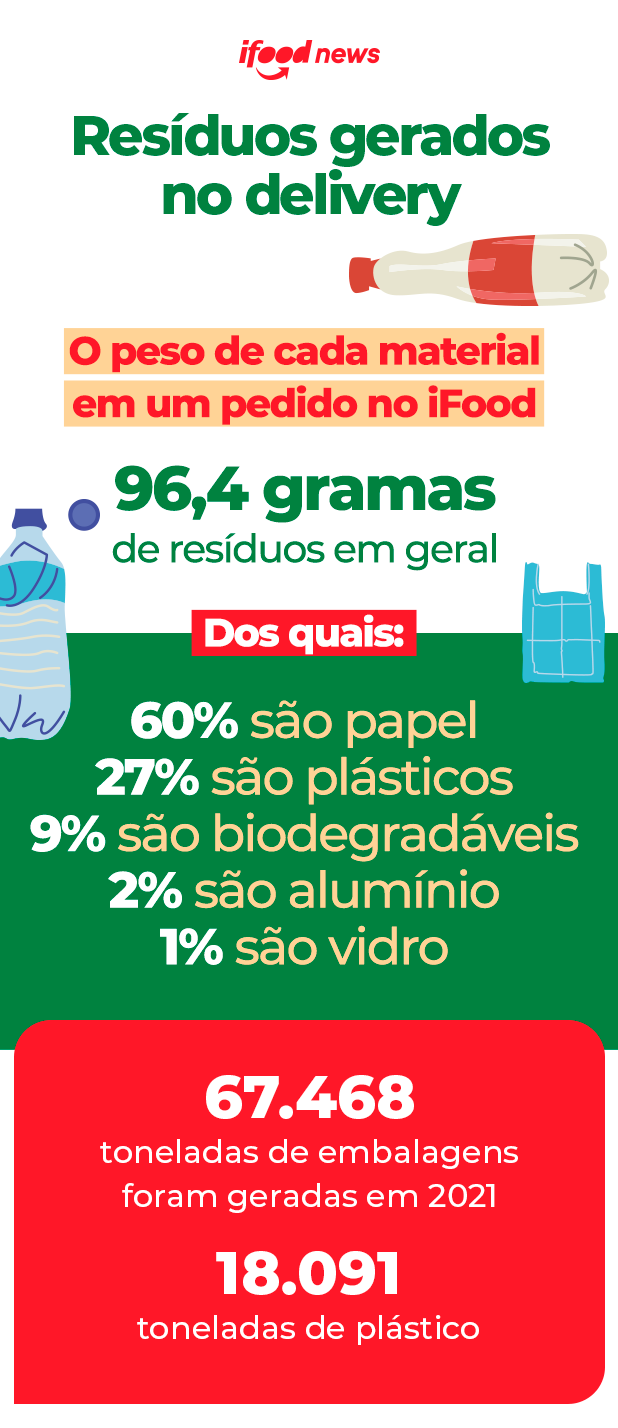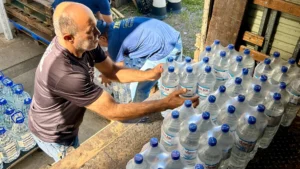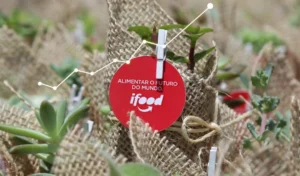Is plastic the biggest generator of waste in delivery? What is its true weight in the packaging required for the food to arrive safely at your home?
To find the answer to these questions, iFood developed its own methodology, in partnership with MANUIA, and calculated the average quantity of each type of waste corresponding to each order.
This unprecedented study measuring waste generated during delivery is the result of commitment of iFood Regenera and #DeLivreDePlástico. Its objective is to eliminate plastic pollution in delivery by 2025, avoiding the use of unnecessary packaging, proposing more sustainable solutions to replace it or creating opportunities to recycle it.
Each order on iFood has, on average, 96.4 grams of waste, the study points out. The majority (57.9 grams, or 60%) is paper — and 30% of this material corresponds to transport bags, which are a more sustainable option to plastic bags.
Even though the percentage of paper is more representative in the composition of an order, this raw material is highly recyclable and has a more developed recycling chain throughout the country, in addition to being a material from a renewable and biodegradable source.
Next comes plastic, responsible for 27% of the composition, by weight, of the packaging of an order (or 26.1 grams of the total amount of waste). In smaller volumes are biodegradable materials (9%), aluminum (2%) and glass (1%).

How can delivery produce less waste?
To reduce this number, iFood created iFood Regenera, a commitment to eliminate plastic pollution from delivery by 2025. Fabiane Staschower, sustainability specialist at iFood, explains that measuring waste is the first phase in putting the commitment into practice.
To this end, the company has developed environmental impact actions, such as awareness campaigns to avoid unnecessary use of plastic, search for more sustainable alternatives to disposable packaging and encouraging recycling.
Fabiane highlights the importance of connecting iFood's sustainable commitment with these actions. “We say we are going to eliminate plastic pollution, but how will we do that? So, iFood Regenera’s actions show our evolution in this sense.”
Friends of Nature
With the “Friends of Nature” campaign, the iFood app now gives customers the option of not having to send forks, spoons, knives and plastic straws when placing an order. So far, 40% of restaurants have joined the initiative, resulting in more than 260 millions of orders shipped without plastic items and avoiding 600 tons of plastic cutlery.
Sustainable packaging
To accelerate the reduction of plastic in deliveries and offer sustainable solutions for replacing this packaging, Fabiane explains that iFood has been looking for alternatives with partners, such as Suzano, Klabin and the growPack.
In a action at Rock in Rio, in September 2022, iFood made more than 230 thousand sustainable packaging available to restaurants at the music festival, made from recyclable 100% paper, with raw materials from renewable, biodegradable and plastic-free sources. The calls “Packaging of the Future” were developed in partnership with Suzano and, before the event, 61 thousand units of the product were allocated to some restaurants, with the aim of gaining market share.
“Soon, we will launch a pilot for testing with a packaging made from corn husks, developed in partnership with growPack”, explains Fabiane. In addition, iFood also seeks moisture-resistant plastic-free bag solutions for refrigerated products.
These studies are important because they offer alternatives to plastic materials — after all, to eliminate the use of these polluting packaging, it is necessary to be able to replace them with sustainable options.
Recycling
With the aim of strengthening the recycling chain and giving the correct destination to waste, iFood implemented 80 PEVs (Voluntary Delivery Point) in Rio de Janeiro, São Paulo and Bahia.
In September this year, the company launched the Guide to Model City in Waste Management to support cities in waste management, in partnership with Manuia. The city of Fortaleza, in Ceará, was the first to adopt the solid waste management model, which was prepared based on the National Solid Waste Policy and Plan (PNRS).
The project I've Been Bag, in partnership with Greening and Retalhar, collects iFood backpacks that are no longer in usable condition and transforms the material into new products, such as bags and fanny packs, or even fuel for industry. Between 2020 and 2021, 124 tons of bags have already been recovered instead of going to landfill.
Finally, iFood offers the Recycle Bot, an environmental education tool that answers questions about sustainability via WhatsApp.


